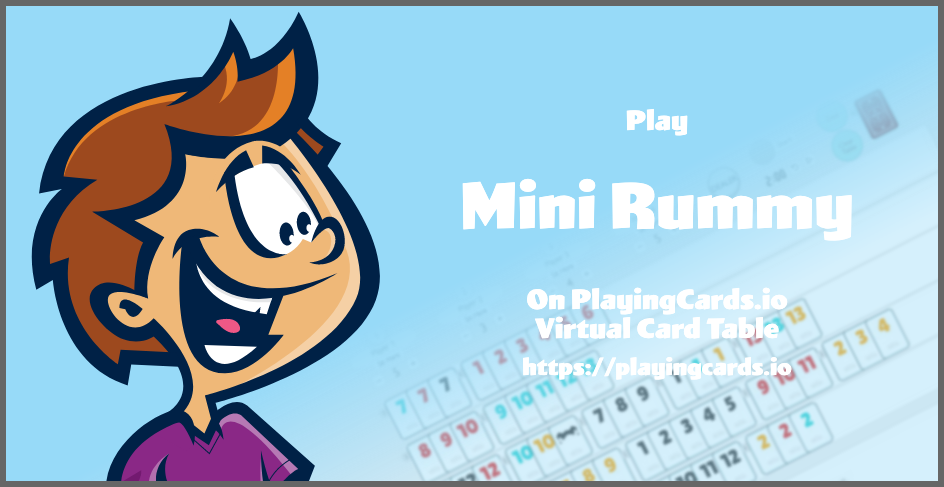Mini Rummy on PlayingCards.io

A fast-paced and competitive game of meld manipulation that combines elements of rummy and mahjong. Surprisingly simple rules make it easy to pick up, but there's still plenty of room for strategy.
Check out our Rummy infographic
Mini Rummy Rules
Objective
- The goal of Mini Rummy is to get rid of your entire hand ("go out") by successfully melding every tile in valid combinations on the table.
- Melds come in two flavors: groups, which consist of three or four tiles of the same number but different colors, and runs, which have three or more consecutive numbers of the same color.
- Even though Mini Rummy is a competitive game, tiles are melded on a table space shared by all players.
Set Up
- Mini Rummy is best played with two to four players. You will need a set of 106 tiles that contains the numbers 1 through 13 in four colors (two copies of each) along with two Jokers.
- Each player will use a rack to keep their hand concealed from the others. Racks/hands also serve as space to organize potential melds before placing them on the table.
- Shuffle the tiles and choose a dealer. Traditionally, this is done by each player taking a tile from the pool, and whoever has the highest will deal. The dealer then gives each player 14 tiles.
- Set a countdown timer for two minutes. This is used to time each person's turn so they don't spend all day rearranging melds.
- Play proceeds clockwise from the dealer.
Playing the Game
- On each turn, players may either draw one tile from the pool or place/arrange tiles on the table.
- If drawing, the player simply takes a tile and places it into their hand. Their turn is then over.
- If melding, start the two minute timer before placing or rearranging melds.
- When placing their first meld of the game, players must make sure the tiles add up to at least 30. Score them based on their face value, with the wild Jokers counting as the number of the tile it represents. These initial melds must be standalone and not added to existing melds.
- Playing melds involves adding one or more tiles from a player's hand onto the shared melding space. Players may rearrange melds on the table in any way that they like during this process, provided that all melds are valid at the end of their turn.
- There are a few additional rules for manipulating melds:
- Melded tiles may never be removed from the table or placed back in any player's hand.
- No single tile can be part of more than one meld at a time.
- "1" tiles are always low, never high, and values do not wrap. For example, 12-13-1 is not a valid meld, and neither is 13-1-2.
- Rearranging table melds is optional, but if a player starts moving tiles, they must arrange everything into valid combinations before the end of their turn.
- When a group or run contains a Joker, players may add to that meld, but they may not remove or rearrange tiles in that meld. However, if a player has an in-hand tile of the same type as the tile represented by a Joker in a meld, they may substitute it for the Joker, then move the Joker to another meld, using it to represent any tile they like. Note: some groups prefer to allow any manipulations with the joker so long as the final result is still valid.
- When the timer is up or when the player is finished with their moves, they must signal the end of their turn by saying "pass."
Taking a Turn
- If a player cannot or does not wish to play melds, they must draw a tile from the pool. Their turn then immediately ends.
- If a player does not draw a tile, they may add new melds or add to existing melds on the table, often rearranging melds in the process.
- Signal the end of a turn by saying "pass."
Scoring
- The first player to go out wins.
- Players who haven't emptied their hands tally the point value of their remaining tiles (Jokers count as 30). Those points are then subtracted from their totals and added to the winner's score.
- If the tile pool is emptied before anyone empties their hand, the game ends. Tally the total value of the tiles in each player's hand; the lowest score wins. Players then calculate the difference between their score and the winner's. The losers subtract that value from their score, while the winner adds it.
- Clear the tiles, reshuffle the pool, and deal another hand, if you like!
Welcome!
PlayingCards.io is an online play space which allows you to play any tabletop or card game directly in your browser, multiplayer with your friends, for free. No app install is needed.
Create a room and share the room code to get started.